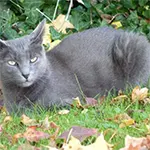
The korat’s coat is short, fine and shiny and close to the body. It comes in a single color, consisting of a blue hue with silver tips. The nose, lips and pads of the feet are dark grayish blue or lavender.
Summary
History and Origin
Tracing back to the 14th century in Thailand, the Korat was first documented in “The Cat-Book Poems,” believed to have been written during the Ayutthaya Kingdom. This breed was traditionally given as a gift, intended to bring luck and prosperity to its owner. Unlike many breeds that have been selectively bred over time, the Korat’s appearance has remained largely unchanged, preserving its historical and cultural significance.
Physical Characteristics
The Korat is medium in size, with a heart-shaped face and large, round, expressive eyes that evolve from blue in kittenhood to a vivid green in adulthood. Its most distinctive feature is its luxuriant silver-blue coat, which is short, fine, and lies close to the body, giving it a shimmering halo effect. This, combined with a muscular build, adds to the breed’s elegance and grace.
Personality and Temperament
Korats are known for their exceptional loyalty and affection towards their owners. They thrive on companionship and dislike being left alone for extended periods. Intelligent and playful, Korats enjoy interactive toys and games that challenge their mental and physical abilities. Despite their active nature, they are gentle and have a soft, soothing purr, making them excellent lap cats.
Care and Health
The Korat is a generally healthy breed with a lifespan of 10 to 15 years or more. They require minimal grooming due to their short coat, though regular brushing can help remove loose hair and maintain the coat’s natural sheen. As with all breeds, regular veterinary check-ups, a balanced diet, and plenty of exercises are essential to their well-being. It’s worth noting that Korats have a hearty appetite and can be prone to obesity if not monitored.
Living with a Korat
Korats form strong bonds with their families and prefer a stable, quiet environment where they can receive plenty of attention and affection. They are well-suited to indoor living and can adapt well to apartments and homes alike. Their gentle nature and patient disposition also make them a good fit for households with children and other pets, provided proper introductions are made.
Latest on CatOlympus
A Remarkable Feline Journey: Rayne Beau’s 1,000-Mile Odyssey Back Home
In the vast and wild terrains of Yellowstone National Park, stories of survival abound. Among the geysers and towering peaks,...
The Importance of Hydration: How to Ensure Your Cat Drinks Enough Water
Water is essential for life, and just like humans, cats need adequate hydration to maintain their health and well-being. However,...
How to Spot and Prevent Parasites in Cats
Parasites are an unfortunate but common issue that many cat owners will face at some point. These unwelcome visitors can...
Understanding and Managing Cat Allergies
Living with cat allergies can feel like a cruel twist of fate for those who adore their feline friends. The...









